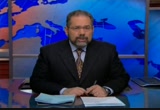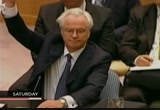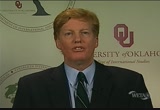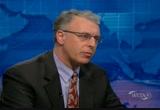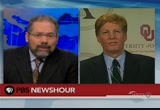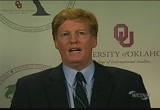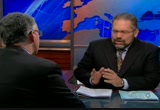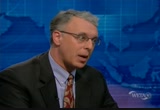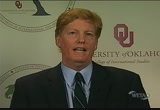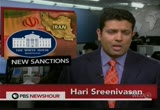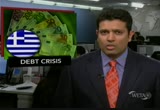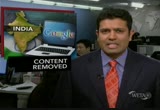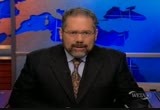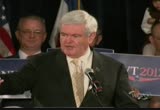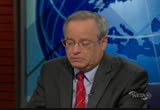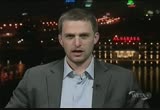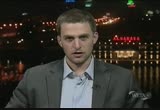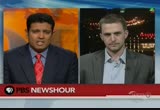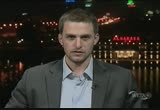tv PBS News Hour PBS February 6, 2012 7:00pm-8:00pm EST
7:00 pm
captioning sponsored by macneil/lehrer productions >> ifill: the u.s. closed its embassy in damascus, and britain recalled its ambassador, as syrian forces intensified their assault against antigovernment protesters. good evening. i'm gwen ifill. >> suarez: and i'm ray suarez. on the newshour tonight, we get the latest on the crackdown, and assess what the international community can and will do to pressure the assad regime. >> ifill: then, judy woodruff has a newsmaker interview with the speaker of the house of representatives, john boehner. >> suarez: betty ann bowser reports on the fallout from a new ruling mandating that faith- based organizations provide birth control coverage.
7:01 pm
>> it's essential for women's health and for the health of their children and ultimately the health of their whole family. >> we think it's really important that we not be obliged to pay for something that we view as immoral. >> ifill: we look at what's next for the republican presidential hopefuls after mitt romney's victory in nevada, with stuart rothenberg of the "rothenberg political report" and susan page of "u.s.a. today." >> suarez: and hari sreenivasan updates the turmoil in egypt, where 19 americans working for nonprofit groups face trial. >> ifill: that's all ahead on tonight's newshour. major funding for the pbs newshour has been provided by: >> bnsf railway. >> and by the bill and melinda gates foundation. dedicated to the idea that all people deserve the chance to live a healthy, productive life.
7:02 pm
and with the ongoing support of these institutions and foundations. and... this program was made possible by the corporation for public broadcasting. and by contributions to your pbs station from viewers like you. thank you. >> suarez: the chaos deepened in syria today. the military rained artillery fire on a rebellious city, as the u.s. and others began withdrawing key officials. diplomats were leaving damascus today. the united states shuttered its embassy and pulled out a.m. bass tore robert ford and 17 other staffers citing worries about security. in london. >> in parallel i have recalled our ambassador in damascus for consultations. >> saurez: william hague dialed back relations with what he called a doomed and murdering regime.
7:03 pm
but inside syria, a new surge of killing. video from mhommes captured the chaosate at a makeshift clinic after third day of shelling by the syrian army. the opposition said at least 50 people were killed in hommes today and human rights groups reported as many as 200 died there on saturday, the worst one-day toll since the uprising began last march. the crackdown intensified even as russia and china vetoed a u.n. security council resolution calling for president assad to step down. western condemnation of the vetos kept coming today from london.... >> the human suffering in syria is already unimaginable and is in grave danger of escalating further. the position taken by russia and china has regrettably made this more likely. >> suarez:... and from paris where the french president branded the vetos a scandal. but u.s. secretary of state hillary clinton insisted
7:04 pm
sunday in bulgaria, that's not the end of it. >> faced with a neutored security council, we have to redouble our efforts outside of the united nations with those allies and partners who support the syrian people's right to have a better future. >> suarez: in moscow though, russian foreign ministers sergei lavrov was making no apologies. >> some of the voices coming from the west assessing the results of the u.n. security council vote on the syrian resolution are indecent, i would say, and border on his tearics. >> suarez: chinese officials took the same line in beijing. >> china actively participated in the draft version of the u.n. resolution. but unfortunately the proposing nation, despite major disputes ang various countries, forced a vote. our goal is to make sure that syrians are spared from violent conflict and war, not to complicate the issue.
7:05 pm
>> suarez: in washington president obama played down the likelihood of outside military action in an interview with nbc news. >> i think it is very important for us to try to resolve this without recourse to outside military intervention. i think that's possible. and the assad regime is feeling the noose tightening around them. this is not going to be a matter of if. it will be a matter of when. >> suarez: as the barrage at hommes raged on, the rebel commander of the free syria army agreed assad will go, but he said there's no other road left except military action. >> suarez: i'm joined now by joshua landis, co-director of the center for peace studies at the university of oklahoma. he was a senior fulbright scholar in syria in 2005 and runs a web site called syriacomment.com. and steven heydemann, a political scientist and senior advisor for middle east initiatives at the united states institute of peace.
7:06 pm
joshua landis, the white house has all but ruled out military intervention. what does the world community have left after the u.n. vote turning down the resolution? >> well, it's clear that nobody... we're in a you-first situation where everybody is expecting somebody else to intervene militarily. the problem is that syria is a big country. 24 million people. it's divided by religious community. the government is the stronghold against an opposition that's largely sunni. we have shades of iraq and lebanon here. this is a complicated battle. and nobody wants to get their military involved. so what's likely to happen is that increasingly they'll begin to fund and arm the syrian opposition and that this will be fought out over a long period of time on the streets of syria and in places like mommes. >> suarez: steven hiderman, do you agree with that analysis that now the attention shifts
7:07 pm
to inside the country. >> i think it does. it's important to remember that all the diplomatic and political activity that was happening outside the u.n. security council is going to continue. sanctions will continue. the arab league is going to continue its efforts to secure support for its political transition framework, but the real focus right now is going to be on military options. and there the u.s. unfortunately is at a real disadvantage. we have stressed our preference for political solution. and what that means is that we have not developed the frameworks that would equip us to manage the militarization of the syrian uprising, to ensure that support for the free syrian army is coordinated and provided in a way that strengthens civilians. and if we don't move in that direction, the potential for support to the armed opposition to produce fragmented militias operating under very limited control is very high. and i think that's likely to
7:08 pm
produce a longer, more violent conflict and one in which at the end of the day we could find that it is the fighters and not the diplomats or the politicians who are determining syria's future. so i think the u.s., even though it's been reluctant to do so, has an opportunity now to figure out how to manage militarization in ways that avoid some of those worst-case outcomes. >> suarez: joshua landis, with what steven heydermann just said, is there any outside force now that the u.n. has taken itself out of the equation that can stay assad's hand to keep him from smashing the opposition? >> i don't believe there are. you know, the united states was hoping that either turkey or the arab league would step in militarily and then the u.s. could provide support for that. i was just in saudi arabia two weeks ago and talked to a number of princes there. none of them said... they all said that saudi arabia is not going to support military intervention in a fellow arab
7:09 pm
country, like syria. which could backfire. i think turkey is very loath to get involved because this is a, you know, this is a big potential quagmire. the syrian opposition has not put together a cohesive leadership. and i think that as steve has said, the leadership is likely to come out of the military. it's somebody we haven't seen yet. this is going to develop over a period of time. syria unfortunately, like iraq and lebanon and the palestinians, is not a cohesive national community. there are a lot of... there are a lot of factions. if america were to rush in or some other country were to rush in and destroy the government, it's unclear who would take charge and how security would be brought to the syrian people. that's something that's going to emerge over time. we're seeingity merging already. there are a number of opposition groups that are getting together, that are getting organized. but by and large what we see are militias on the ground.
7:10 pm
they're organized based on town and city. and they don't agree always on ideology. and they have to come together. if they're going to beat this regime which still has a professional army and real weapons, they're going to have to begin to get a command-and-control and they're going to have to come together and work together. >> suarez: the rest of the world doesn't want to get involved but if you look at a map of syria, it touches all of the hot spots in that part of the world. iraq, lebanon, israel. it borders with turkey. if there's instability in syria, isn't it a big problem for a big bunch of countrys? >> it's an enormous problem. syria sits right at the intersection of virtually every key strategic rivalry in the region. it boardered israel. it borders turkey. it is part of a group of states through which iran has projected its influence in the region. and so instability in syria holds the potential for spillover in all kinds of directions: into lebanon and elsewhere.
7:11 pm
that would really raise the steaks of conflict in syria. but where i disagree a bit with josh is that even though from is a great deal of reluctance to get involved militarily in syria, we see already very troubling indicators that informally governments in the region are beginning to provide arms and equipment and support to the free syrian army. we have heard rumors about this happening through the... we've heard rumors about this happening from lebanon and from saudi arabia. and this contributes to the fregmentation of the way in which groups inside syria acquire military support and equipment. we'd be much better off if we had frameworks for coordinating those efforts so that fragmentation didn't occur and so the military remained under civilian authority. i think we should make an investment to prevent those things from happening. >> suarez: so, steve
7:12 pm
heydermann is talking about countries spiriting weapons in. the russians are supplying the syrian government, aren't they, joshua landis? >> they are indeed. i'm sure iran is helping out where they can. this is, you know, this has an international dimension. russia does not want to see syria collapse. it's a long time ally. it's got an important port there. the only port that the russia has in the mediterranean and they see this as a, you know, as the canary in the mine shaft in a part with iran because if syria is taken down, the syrian government, iran is going to be next. and they don't want to see iran fall, neither does china. china gets much of its energy from iran and has invested a lot in iran. so change in this, you know, both in syria and iran is going to come at a high cost. there's no doubt about it. >> steven heydermann, before we close, how important is it for a country to close down its embassy in a nation with which it has diplomatic
7:13 pm
relations? the united states closed it, evacuated its personnel. the united kingdom recalled its ambassador. a big thing? >> these are very, very important shifts in policy. the statement from the state department today included language indicating that we no longer believe that the syrian government has full authority over its territory. that's quite something. you don't often hear that from the u.s. government. in addition, what it means is that we've made the decision that conditions on the ground have now deteriorated to the point where ambassador ford can no longer perform effectively on the ground. that, too, tells us something very important about how we assess the state of the conflict in syria. i should say that the embassy wasn't closes. it was suspended. the state department mentioned that ambassador ford remains the ambassador to the syrian people. and he will be working from washington to reach out to the opposition, to continue strengthening and supporting the syrian opposition.
7:14 pm
so, we have made a decision which i think is quite telling about how far things have spiraled out of control in syria, but it doesn't mean that the mission will end its work. >> suarez: steven heydermann, joshua landis, good to talk to you about. >> a pleasure. >> thank you. >> ifill: still to come on the newshour, house speaker john boehner; catholics and contraception; the republican presidential contest; and americans facing trial in egypt. but first, with the other news of the day, here's hari sreenivasan. >> sreenivasan: president obama has imposed new sanctions on iran and its central bank. the move was mandated by congress to increase pressure on the iranian regime over its nuclear program. today's white house announcement followed growing talk that israel might attack iran soon to set back that effort. but white house spokesman jay carney said the timing of the sanctions is not related to those reports. >> there has been a steady increase in our sanctions activity. and this is part of that.
7:15 pm
part of that escalation. it's not related to specifically to that issue or the questions about it. >> sreenivasan: the u.s. and israel say iran's ultimate goal is to produce nuclear weapons. iran insists its program is for peaceful purposes only. greece agreed today to a major new austerity measure, eliminating 15,000 government jobs. the european union and the international monetary fund pressed for the cuts, as part of a bailout deal worth $170 billion. greek unions have called a nationwide strike for tomorrow to protest the new cuts. wall street got off to a slow start for the week. the dow jones industrial average lost 17 points to close at 12,845. the nasdaq fell more than three points to close just under 2902. a deep freeze paralyzed much of eastern europe for another day. the cold wave is more than a week old, with no immediate end in site. rescue crews in bosnia used helicopters today to evacuate trapped residents and deliver food to remote mountain
7:16 pm
villages. and people in eastern romania worked to dig out from the heavy snow. meanwhile, children across serbia took to their sleds, after officials declared an emergency and cancelled school for the week. >> the decision to declare an emergency situation is primarily to protect citizens. we made the decision that children do not go to school for a week primarily because of their health and to save energy. >> sreenivasan: at least 150 deaths have been blamed on the european freeze. google india has taken down web pages within their network that the indian government deemed offensive to political and religious leaders. the move came today after a new delhi court ordered 22 major internet firms to do more policing of what is available to online users. the indian communications minister insisted it is not a question of censorship, but one of "responsible behavior." the new york giants arrived home today after beating the new england patriots, 21-17, to win super bowl xlvi.
7:17 pm
the players flew into newark, new jersey, today, bringing with them the giants' fourth super bowl championship trophy. airport workers waved the players off. a parade and rally are planned tomorrow. the game was the most watched program in television history. but nbc and the nfl had to apologize today for an incident at halftime, when british hip- hop star m.i.a. made an obscene gesture. those are some of the day's major stories. now, back to gwen. >> ifill: we turn now to our newsmaker interview with speaker of the house john boehner. judy woodruff sat down with him in his ceremonial office at the u.s. capitol this afternoon. >> woodruff: speaker john boehner, thank you very much for talking with us. >> good to be here. >> woodruff: so you begin this new year with polls showing the american people have never held congress in such low regard. is that something that you think congress deserves? >> well, judy, welcome to divided government. you know, the house is controlled by republicans, the senate controlled by democrats. we have a democrat in the white house.
7:18 pm
both parties have strongly held positions, but i think the american people expect and frankly deserve for us-- even though we have strongly held positions-- to find enough common ground to do what is necessary to get our economy moving again and get people back to work. >> woodruff: well, the polls also show that people think that a lot of it this gridlock and what they see that they don't like is due to members spending more time doing partisan bickering than doing what's good for the country. is that a fair perception? >> i don't think so. on an average day, 90% of the time members of congress, both sides of the aisle, are working together and doing the people's business. but the media would only typically focus on us when we're having a disagreement. that's really what most people see are the disagreements. >> woodruff: but you're not suggesting the congress gets along most of the time. >> we do get along most of the time. it's really rather surprising. when you look at the number of bills that come through here, the number of hearings that go
7:19 pm
on, where members of congress on both sides of the aisle actually do work together to do the people's business. >> woodruff: so this perception that members are beholden to their base, in effect, both parties. and it's hard to work.... >> it only shows up on the really big bills where there are really strongly held beliefs. you know, the president wants to go out there and raise taxes on the american people. we believe that if you really want fairness, why don't we take the whole tax code and make it flatter and fairer for all americans. >> woodruff: what do you think it would take for congress to function in a way that would be to the benefit of all the american people? >> well, i've spent a lot of time over the last year focused on the institution itself. if you look back over the last 20 years that i've been here, the process on the floor has been tighter and tighter and tighter where in the last... in 2009-2010, about five
7:20 pm
members would decide what the beginning and the end of the bill were going to look like. happened to be the same five people. 430 of us literally sat on the side lines. i'm a big believer that we need to open up the process. i think members of the house will tell you, both sides of the aisle, that there's a much more open process here in the house. a much fairer process for members of both political parties. secondly, i believe that we need to rebuild the committee system. because if more bills have to come out of committee and come to the floor under an open process, it will require members on beet sides of the aisle to begin to reach out to each other more at the committee level, beginning the process of melting some of the partisan scar tissue that's built up over the years. >> woodruff: president obama has had his own ups and downs in the polls. how would you describe your relationship with him? >> the president and i get along fine. we really do. we have a very cordial
7:21 pm
relationship. doesn't mean we agree on everything. but the president and i have had a lot of frank conversations about the big issues that our country is facing. whether it was the issue of the debt, whether it's the issue of foreign policy or our defense posture, we've had a lot of very good discussions. unfortunately we're not seen a lot of results. >> woodruff: how recently have you spoken with him? >> i talked to him just last week. >> woodruff: do you want me to tell me about what? >> i'm sure you'd love to know. >> woodruff: because he says that he thinks you would do more, you would be able to work more with the administration except you have members who just won't let you? >> when the president and i have been able to come to an agreement, there have been no issue at all in getting whatever the agreement was getting it passed. i think it's an excuse that the white house uses because there's so many areas we've not been able to come to an
7:22 pm
agreement on. >> woodruff: well, it appeared to the public last summer that you and he were pretty close to a deal on the debt ceiling. the big budget cuts, tax increases, but that you were in effect held back by your own membership. is that what happened? >> no, no. i was more than willing to put revenues on the table. i thought if we reformed our tax system, we could produce more revenue from it. but i told the president i'm not going to put more revenue on the table unless you're willing to make real changes to our entitlement programs because in their current form they're not sustainable. the president would never say yes. to any of those changes to the entitlement programs. even though i had revenue on the table and the president hasn't said yes, he came back and wanted $500 billion more in revenue. there's a way to do this. but it takes courage. and i am more than willing to address this problem at any
7:23 pm
moment with the president because the future of our country depends on us coming to an agreement that will begin to solve our debt problem. >> woodruff: but this perception, mr. speaker, that there is a sizable group of republicans in the house who are more conservative, who are just... just want you to go in a different direction. >> certainly in both political parties we have our share of divisions. while there are some divisions within the republican side of the aisle, they pale in comparison to the divisions on the other side of the aisle. but my job is to bring our team to do what's do-able. and work with our senate colleagues and the white house to do the american people's work. you know, i'm presiding over an institution that was designed not to work. you know, the founders gave us 435 members from all across the country. one big committee to solve america's issues.
7:24 pm
it's a demanding job. but i'm glad i've got it. >> woodruff: what are your main priorities this year that you think you can get done? >> i think the issue of getting the economy moving again and creating more jobs is the number-one issue. we had a fairly good jobs report last friday but, you know, i would argue it wasn't good enough. you know, we still have millions of americans asking the question, where are the jobs? so when we look at this year, our focus is going to continue to be on jobs like it was last year. we've got federal aviation reauthorization that finally after 23 extensions we were able to come to an agreement with the senate. passed the house last week. it will pass the senate this week. the american energy and infrastructure jobs act will be up here in the couple of weeks. opening up more areas for energy development and using those new revenues, royalty
7:25 pm
revenues, to pay for our aging infrastructure that needs really pair. we'll do this in a way that has no earmarks. the last highway bill had 6,317 earmarks in it. little projects for members of congress and their disstrict. some of them not so little. no earmarks. there are some things that we can do that will get our economy going again. the house has the plan for american job creators since last may. we've passed 30 bills that would help our economy grow. 27 of them are still sitting in the united states senate. if we're serious about jobs and the economy, the senate has to take up some of these bills and actually act. >> woodruff: one of the unresolved issues from last year was the payroll tax cut extension. the big brouhaha over it in december right before christmas. are your members going to be premiered to go along with the year-long extension? >> our members were prepared. we passed a year-long
7:26 pm
extension and a payroll tax credit in december. >> woodruff: but it included the administration, democrats, were never going to go along with. >> we had reasonable offsets in spending. most of them came from the president's own budget. we've done our work. we're in conference with the senate trying to come to an agreement but it's pretty clear that our senate colleagues want no part of cutting spending. now if we're going to extend the payroll tax credit and we're going to extend unemployment benefits with reforms and take care of the so-called doc-fix, we're going to have to offset this spending. but my colleagues on the other side of the aisle don't want to offset this spending. we're in conference with the senate. i'm hopeful we'll be able to come to an agreement quickly. >> woodruff: on the bigger question of cutting government spending, the super committee's failure, the requirement now that congress make deep cuts in defense, deep cuts in the entitlements, is that a process that's going
7:27 pm
to hold because a lot of members, many members are now talking about ignoring it. >> one of the real successes from last year is that we were able to cut $2.1 trillion worth of spending over the next ten years. that's already law. it's going to happen. the second part of that agreement came about as a result of the failure of the super committee. so there's another $1.2 trillion worth of spending cuts that needs to occur over the next ten years. and because we weren't able to come to an agreement, there's a so-called sequester, automatic cuts go into place. i'm not happy about the sequester. the way it's made up. i think it could be replaced. i think the defense cuts that would take place in january of 2013 are unsustainable and will put america at a distinct disadvantage when it comes to defending our interest at home and abroad.
7:28 pm
>> woodruff: you think that will be undone? >> i think it's going to have to be replaced. you just can't undo it. it needs to be replaced. >> woodruff: two questions about the campaign here. this is another year when every single member of the house.... >> we have elections too often. it gets in way of doing good work here in washington. >> woodruff: your friends and the democratic party and the democratic side of the house are predicting that they can take back the house majority this year, that they can win back at least the 25 seats it would take to regain the majority. what do you think? should they be so confident. >> i don't think they should be that confident. but it's going to be an election. we have redistricting going on all across the country so most members will be in new districts. but while i think there's going to be a real fight, i think that we have a reasonable opportunity to maintain the majority. i promised the american people when we took the majority that my job was to listen to them
7:29 pm
every day and to follow their will. whether it's cutting spending or getting our economy going again, we've done what the american people have asked us to do. >> woodruff: finally on the presidential campaign, i know you need to stay neutral. you're officially neutral because you're the speaker. but it's pretty clear this has been a rough campaign. a lot of personal attacks among the republicans candidates, the tone negative, the advertising negative. are you concerned that going into the fall that this kind of tone... we've already seen turnout low in the early primary states. are you concerned that could continue and hurt republicans in the fall? >> well, no one likes to see nasty campaigns. but i would remind you that the fight in 2008 between barack obama and hillary clinton went on through june of that year. so while i would rather not see it, it's part of the political process. out of this will come our nominee. and i don't think it will have any impact on the november
7:30 pm
election. >> woodruff: should they don it down? >> listen, i'm not going to tell them what to do. that's not my job. >> woodruff: mr. speaker, we thank you very much for talking with us today. >> thank you. >> woodruff: thank you. >> ifill: we will have an interview with house minority leader nancy pelosi next week. >> suarez: now to the continuing fallout over the obama administration's recent decision on covering contraceptives. leaders in the catholic community are pushing back hard against a new mandate that requires coverage of those benefits under the health reform law. newshour health correspondent betty ann bowser reports on the battle lines from both sides. ♪ >> reporter: holy ghost catholic church in downtown done ver is a popular parish with a chief mission of serving the poor. yesterday the focus was not on
7:31 pm
charity. it was on a new federal regulation regarding health insurance. from the pulpit, father michael warren had strong words. >> the president of the united states who has recently made a decision to impose upon catholic institutions-- hospitals, schools, charities-- that they must provide for their employees coverage for contraception, coverage for sterilization, coverage for drugs that would induce abortion. without choice. this is in direct contradiction to our gospel values. >> reporter: when he finished his homily the congregation broke out in wild applause. ( applause ) and when the mass ended, it was clear most of his flock stood behind him. >> i think it's atrocious not only is it bad medicine but it tramples on our first amendment rights. >> i feel that it's an affront
7:32 pm
on my citizenship. entirely about religious freedom. i am obviously against contraception. but we live in a free country. >> reporter: the new rule was issued last month by the department of health and human services. not only did it say employers who offer health insurance must provide contraception, they uft also do it free of charge. churches are exempt from the regulation, but because catholic hospitals and universities serve many americans who aren't catholic, the administration said they must comply. at the white house, press secretary jay carney explained. >> the new guidelines require most private health plans to cover preventive services including contraception for women without charging a co-pay, co-insurance or deductible. the guidelines were recommended by the non-partisan independent institute of medicine. >> reporter: the new rule grew out of an i.o.m.report last
7:33 pm
year that recommended a major expansion of birth control services to women. the report said in part, "women with unintended pregnancies account for almost half of pregnancies in the u.s., and those women are more likely to smoke, consume alcohol, be depressed, and experience domestic violence." the i.o.m.also said, "expanded birth control services to women will cut down on the number of abortions and make women healthier." the obama administration says 28 states already have similar mandates, requiring contraceptive coverage. but me catholic leaders say the states have broader exemptions than the new federal mandate. marcia greenberger is co-president of the national women's law center in washington. she supports the new federal rule. >> it's essential for women's health and for the health of their children and ultimately the health of their whole
7:34 pm
family. and that's why the institute of medicine, all of the scientists and medical experts, said that contraception is an essential health benefit that should be available without co-pays, without deductibles. >> reporter: but the scope of the new regulation raises complex legal and moral questions. john garvey is the president of the catholic university of america in washington. >> it is not about whether the health care law to provide for or even insist on coverage of contraceptive care for women. it is about whether every institution that provides a health care plan ought to be obliged to pay for that even if they have religious objections to it. >> reporter: garvey is also a legal scholar who focuses on
7:35 pm
constitutional law. he teaches a class weekly at the university and believes it doesn't matter that the students they serve are not all catholics. >> it requires us to contradict in our actions the very lessons that we're teaching with our words in classes and in our daily activities at the university. it makes us hypocrites in front of the students that we're trying to educate. >> reporter: but many university employees and students on the school's health plan have used birth control and want the school to comply with the regulation. 27-year-old erin mccarthy a non-practicing catholic is studying for her master's in social work there. right now she says she can't afford to pay for birth control out of pocket. >> a generic would cost $30 a month. something like that. you know, it may not seem like a lot but without a full-time job it adds up. $30 can buy groceries for a
7:36 pm
few weeks. >> reporter: recent studies have found the vast majority of catholic women use birth control at some point in their lives. greenberger believes it's a woman's right to have coverage. >> we don't see families of 8 to 12 children these days in religious pews, whatever the religion may be because of the widespread use of contraception. that's really reflective of the recognition that contraception is essential for women's health. it's essential to have healthier children. and of course it means that for the well being of the whole family unit. >> reporter: anthony, the general counsel for the u.s. conference of catholic bishops, says that's not the point. >> whether or not individual catholics or others in society happen to agree with that is really not the issue. instead it's the question of whether the government can force this religious
7:37 pm
institution that happens to have these commitments to violate those beliefs as a matter of federal law. >> reporter: the american civil liberties union and other organizations in support of the obama administration say the rule is is an infringement on religious liberty because women are still free to follow their own beliefs. and at this point institutions like catholic university can apply for a one-year extension to the mandate before having to comply. but anthony warns the bishops will still look for ways to stop it. >> the bishops are highly motivated to pursue every means legally available to them to get rid of this mandate. and they'll do it by litigation if they have to, by ledge legislation if they can, by public advocacy. basically they're not going to stop until it's gone. >> reporter: supporters of the mandate hope it will not be expanded to cover catholic institutions outside of the church. >> to broaden that exception,
7:38 pm
to well over a million women and their families, would be terrible health policy in this country. it's too essential for our efforts with respect to infant mortality, maternal mortality, the health and future of this country. and i put it in those major terms because that's really what contraception is all about. >> reporter: the new rule takes effect in august, but religious institutions like catholic university can file for a one-year exemption. >> ifill: next, to campaign politics. the two leading contenders for the republican nomination spent the day campaigning in colorado, where voters caucus tomorrow. former house speaker newt gingrich, who came in a distant
7:39 pm
second in saturday's nevada caucus voting, turned his attention to the man who came in first, mitt romney. >> i think the number one difference between me and the other candidates in this race is the scale of change. governor romney doesn't represent profound change. he doesn't represent... if you look at what he did in massachusetts, he basically accommodated liberal democrats. if you look at romney care compared to obama care, if you look at who he appointed as judges they were people who made liberal democrats happy. he's not a bad person, per se. but he's also not a person who goes in there with force and will and fundamentally changes things. >> ifill: but romney all but ignored gingrich, deciding instead to focus almost entirely on the man he ultimately wants to unseat. >> ifill: and to some analysis, >> president obama three years ago was on the "today" show. he said if he couldn't turn the economy around in three years, he's looking at a one- term proposition. ( cheers and applause ) by the way he was on the today
7:40 pm
show again this morning. on a anniversary of that statement. he said he deserves a second term. >> crowd: no! >> no, mr. ate'. you do not deserve a second term. i'm afraid based upon the president's own standard he has failed. he does not deserve a second term. >> ifill: and to some analysis, from susan page, washington bureau chief of "u.s.a. today," and stuart rothenberg of the "rothenberg political report" and "roll call" newspaper. stu, let's go back to betty anne's piece because it was kind of interesting that today not on the stump but online mitt romney started a petition talking about how president obama was forcing his secular vision on america. we've heard newt gingrich and rick santorum talking about the president's war on lj. what's at stake. >> of course there's a segment of the republican party that really cares about cultural issues. it's funny up to the last couple of elections i read somewhere mostly from democrats that cultural issues don't matter anymore. it's all about jobs and the economy and the new economy. but there is a deep cultural
7:41 pm
division in this country with most traditionalists with the republicans and most liberals or progressives with democrats. when you get an issue injected into a campaign like this, that is so controversial, i think it's bound to create reverberation where the politicians start to speak out. >> ifill: a classic wedge issue. >> it is. >> ifill: susan, does this mean that the catholic vote is a monolith? this is a critical voting block. >> it is a critical voting block. it's been an important voting block for president obama. he won 54% of catholic voters in 2008 turning around the deficit that senator kerry had suffered four years earlier. we find catholic voters about 20% of the u.s. electorate is catholic. in some swing states they make up as much as a third of the electorate in places like wisconsin and pennsylvania and new mexico. one other thing to know about the catholic vote is a lot of
7:42 pm
latinos are catholic. we know latinos will be a crucial voting group this time. and they tend to be many latinos tend to be conservative socially. it seems to me that president obama has kind of opened a fight on this that may not... that may create some problems for him down the road. >> this is exactly right. look, we've had battle lines on abortion have been drawn for a long time. we know there are pro-choice catholics and pro-life catholics. they won't chak their views. they're going to vote the parties the way they have. but there are enough kass yul voters, independent voters who are catholic, swing voters in key states that they could determine who wins some of the key states. >> ifill: let's talk about casual voters or the not so casual voters. we saw in nevada. turnout was not what was predicted. does that mean the enthusiasm gap has gone away. >> turnout in florida a week earlier was down from 2008. i think this does raise questions about how enthusiastic republican voters
7:43 pm
really are about this field. we know they're enthusiastic about defeating barack obama. are they enthusiastic about electing mitt romney or newt gingrich? i think this raises some question. >> ifill: how much of this is about the process of a caucus? we'll see a couple more of those coming up. is it about the way caucuses are conducted that people are less likely to show up? >> i don't know about that. i'm not sure it's that. but i think there is some question about how revved up republicans are. you would think that they should turn out to these events if they felt strongly about these candidates and the fact that they aren't showing up in huge numbers. predictions were that turnout would be bigger. well, it wasn't. you have to wonder why. >> ifill: i read all four of the remaining candidates will be in four different states tomorrow night which is the next round of voting, a lot of beauty contests, no delegates awarded. is what we're seeing tomorrow in missouri, colorado, minnesota, is it a pit-stop on the way to super tuesday? >> it's not one of those big, big election nights, i don't think. it is important. mitt romney as you pointed out
7:44 pm
in the piece wants us to think he already has the nomination. he's focusing his fire on barack obama. if he doesn't win all three of these or at least two of them, doesn't that raise some questions about that? about whether wees really on his way. we know rick santorum is hoping to win in missouri's non-binding beauty contest primary that they have tomorrow night. and that minnesota seems quite competitive. we know minnesota is a place with a lot of tea party voters. as michele bachmann taught us. >> ifill: how about newt gingrich? he has been saying that he has the strategy which takes him through the south and to texas. there is a survival path there. >> right. his strategy. >> ifill: you crunch numbers. >> his strategy goes to texas on april 3. there are a number of corn primaries coming up throughout march. i think the key may well be tennessee. i hate to pick one state. but on super tuesday, you know, massachusetts is there. you'd have to figure that mitt romney will do well. georgia is there. you have to figure newt gingrich.
7:45 pm
ohio will be a key state. but as the former speaker says, the south is the key. tennessee is a southern state but it's really a very mixed state. the eastern part of tennessee is mountain republican,. howard baker. senators corker, lamar alexander. west in tennessee and it's the more southern part of the state. >> ifill: does rick santorum have a chance to break out? >> i think rick santorum is looking for a number of places to break out. mitt romney wants to create momentum. i think santorum wants to become the alternative. >> ifill: what do you think about newt gingrich? >> i think hedging your hopes on tennessee on super tuesday sounds a little frail to me. i mean he's got to wait so long before he wins again. he won in south carolina. he's going to wait until march 6 to win again? and then he's going to win in tennessee not in ohio which is a mega state much more important state when you get to the general election. you know you don't want to count newt gingrich out. he's come back twice when we
7:46 pm
we didn't expect it. this would be historic. we would not have seen before a case when somebody would come back from the deficit and get the nomination. >> can i respond to the shot she just took at me here. quickly, susan, my point is that newt gingrich is talking about a southern strategy. he's not going to win virginia because he's not on the ballot. if he can't win tennessee that means he wins only georgia. i think we'll discount that as his home state. >> ifill: i saw ron paul being interviewed on cnn he was asked what is the one state you can win. he said i don't worry about that stuff. that is somebody else's job. >> i think he might win maine. they report out on saturday. he's gotten big crowds in maine. it's the kind of slightly quirky state. a caucus state. where a small band of really devoted followers perhaps can make a difference. but of course i don't think ron paul is really running for the nomination. he's running to affect the course of american history. to affect the platform. to make a statement. so for him it seems to me it's easier to see a path for him to stay in this all the way to
7:47 pm
tampa than it is for the other two challengers. >> i agree entirely but if we're looking for a quirky state that ron paul could win i think it says something about his overall prospects. >> ifill: okay. every week you're sitting in this chair, stu rothenberg, susan page, thank you both very much. >> thank you, gwen. >> suarez: finally tonight, egypt's military rulers and the u.s. head for a showdown, over egypt's threat to bring to trial 19 americans and 24 others working for nongovernment groups. among those being held is sam lahood, the son of u.s. transportation secretary ray lahood. the obama administration has threatened to cut off nearly $2 billion in military aid if egypt goes ahead with a trial. hari sreenivasan talked with matt bradley of the "wall street journal" in cairo earlier today. >> matt, thanks for joining us.
7:48 pm
exactly what are the charges that these americans and others are being held on? >> the 43 people who are being charged are facing charges of establishing an illegal organization and accepting and distributing funds illegally without the approval of the egyptian government. and those charges, if convicted, they could get a penalty, a financial penalty or they could get about five years in prison. >> sreenivasan: this isn't just a threat of deportation that these individuals are facing, right? >> well, it could be that. it seems very unrealistic that the government, that the egyptian government would want to put these people away in jail for several years. but anything is possible at this point. >> sreenivasan: why exactly is the egyptian government in its current form doing this? is there a strategic advantage? what are you hearing. >> it's very, very difficult to discern why the egyptian government would want to do something like this. the egyptian government, of course, says this is a judicial investigation. once it hits the judiciary there's nothing they can do to
7:49 pm
stop it no matter what kind of diplomatic channels the united states tries to use. however, a lot of people in the ngo community in the activist community, they say that this is an obviously politicized case and that it started in the government. maybe they're not as in control of it now as they used to be but they instigated the case against these ngos and that they're doing this in order to basically deflect blame on some of the violence and continuing protests that have been going on here in cairo since the revolution last year on to foreign hands so the egyptian government knows very well that the public will lap up any conspiracy theories that involve foreign hands trying to destabilize egypt for whatever reason. and so that's one of the things that we've been hearing again and again every time there's murder or killing in the square where egyptian forces, the military or the police, try to suppress angry dissidents. they say that this violence is not caused by egyptians
7:50 pm
opposing the regime. they say it's caused by foreign hands trying to infiltrate these protest movements and turning them against the egyptian regime in order to destroy the economy, in order to create chaos. it's not quite clear what the political motive is behind that and to what political end that would meet. >> sreenivasan: what about the rhetoric from the united states, everyone from president obama to hillary clinton has tried to turn up the heat a bit and tried to say that this could impact a larger amount of foreign aid that we give to egypt. is that resonating at all? >> well, for one thing, let's be clear. the egyptian public is not really talking about this. they were talking about it at the end of december when the raids on the ngos occurred, when police, backed by the military with prosecutors, went into these ngos, investigated, took a lot of documents and cash and sealed up the offices. but since then there hasn't really been a lot of talk in the media here in egypt when what's been going on. there's been much bigger
7:51 pm
distraction including some of the street protests that have been going on now. but when it comes to what the egyptian government is saying, they are basically saying that this is not an issue that they can intervene on. >> sreenivasan: two of your organizations that have u.s. backing-- the national democratic institute and the international republican institute-- they were invited into the country as observers, right? >> well at least in the case of n.b.i. it has been here since 2006. and they applied for an application for registration in 2006 but that process has never really come to fruition. they've called several times the ministry of foreign affairs and the ministry of social solidarity who normally deals with this sort of thing and they've said all of your application papers are in order but we haven't really come to a decision on whether or not to approve you. this is a very similar tactic that the mubarak regime used where if there was sort of an independent satellite station or an international organization that wanted the
7:52 pm
right to operate here in egypt, they would allow them to operate openly but suspend licensing for them so that they could have a pretext at any moment to shut them down. >> sreenivasan: so where are these individuals now? are they in custody anywhere? are they just in different parts of the city and scattered and waiting for a court date? >> there are 43 individuals total. 19 of them are americans. and 13 of those americans are not in the country. one of the reasons why is because a lot of these people, they work for organizations like n.b.i., and i.r.i., and they came and visited for a couple of weeks or a couple of months in the past year. and the egyptian government took notice of them and included them on this list of charges. but there are six americans who are on this list of people who are facing charges who are still here in cairo. we know that three of them are actually taking refuge right now at the u.s. embassy. >> sreenivasan:. >> sreenivasan: what the possible outcome here? could we see a trial situation where we see them in that cage that we've seen so many images of former president mubarak
7:53 pm
in? >> it's quite possible. no one really knows. they might not be arrested. you can face rile in egypt without having been arrested. so it's possible that they will not necessarily have to go behind bars. but the real important outcome that's coming here is that congress is going to be taking a very close look at the 1.3 billion dollars in aid that it gives to the egyptian government every year. now in december there was legislation that was introduced that said that the secretary of state hillary clinton was going to have to certify to congress that the egyptian government or the egyptian military which is running the egyptian government was abiding by the peace treaty with israel and adhering to certain human rights norm like freedom of association and freedom of assembly. hillary clinton has already threatened the egyptian military and said that they doesn't, considering this ngo flap, she doesn't think she'll be able to certify to congress that the egyptian government is abiding by these principles. so this $1.3 billion which is
7:54 pm
the hallmark and sort of the bedrock on which the egyptian- american relationship is built is really a threat. for the first time really in about 30 years. >> sreenivasan: matt bradley from the wall street journal, thanks so much. >> thank you. >> ifill; again, the major developments of the day. the u.s. closed its embassy in damascus, and britain recalled its ambassador, as syrian forces intensified their assault against antigovernment protesters. greece agreed to eliminate 15,000 government jobs. >> suarez: our reporting continues online. on our health page, we look at the debate surrounding a different kind of health care mandate, one that could force many hospital workers to get a flu shot each year. and every weekday, our politics team brings you the latest
7:55 pm
developments from the campaign trail and washington. find a link to sign up for the morning line e-mail on our home page. all that and more is on our web site, newshour.pbs.org. and that's the newshour for tonight. on tuesday, we'll talk with italian prime minister mario monti about europe's financial woes. i'm ray suarez. >> ifill: and i'm gwen ifill. we'll see you online, and again here tomorrow evening. thank you, and good night. major funding for the pbs newshour has been provided by: >> moving our economy for 160 years. bnsf, the engine that connects us.
7:56 pm
and by the alfred p. sloan foundation. supporting science, technology, and improved economic performance and financial literacy in the 21st century. and with the ongoing support of these institutions and foundations. and... this program was made possible by the corporation for public broadcasting. and by contributions to your pbs station from viewers like you. thank you. captioning sponsored by macneil/lehrer productions captioned by media access group at wgbh access.wgbh.org
7:59 pm
202 Views
IN COLLECTIONS
WETA (PBS) Television Archive
Television Archive  Television Archive News Search Service
Television Archive News Search Service 
Uploaded by TV Archive on

 Live Music Archive
Live Music Archive Librivox Free Audio
Librivox Free Audio Metropolitan Museum
Metropolitan Museum Cleveland Museum of Art
Cleveland Museum of Art Internet Arcade
Internet Arcade Console Living Room
Console Living Room Books to Borrow
Books to Borrow Open Library
Open Library TV News
TV News Understanding 9/11
Understanding 9/11

